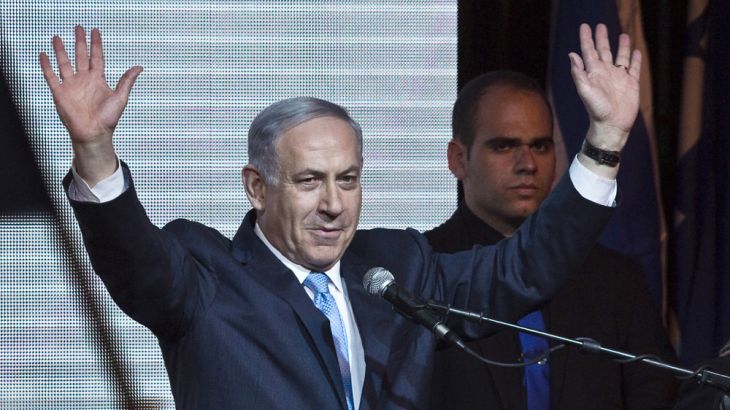Netanyahu wins elections
Prime Minister’s right-wing Likud party wins surprise victory, sweeping past rival Zionist Union in bitter campaign.

Haifa – With more than 99 percent of the votes tallied, Israel’s incumbent Prime Minister Benjamin Netanyahu appears poised to retain his office and form the next government.
Though the final campaign polls showed Netanyahu’s right-wing Likud party trailing behind the centre-left Zionist Union, headed by Isaac Herzog, Likud gained 30 seats, six more than its main competitor, according to official results released on Wednesday.
The Joint Arab Coalition, an electoral alliance of four Palestinian-majority parties in Israel, pulled 14 seats, and Yesh Atid, the centrist party headed by former finance minister Yair Lapid, earned 11 seats. Kulanu, a right-wing breakaway party led by former Likud member Moshe Kahlon, took ten seats.
|
|
| Arab bloc claims third largest force in Israeli parliament |
A number of smaller, mostly right-wing parties were unable to break the single digits: Jewish Home earned eight seats, the religious Shas and United Torah parties each got seven and the ultra-nationalist Yisrael Beitenu has six seats.
The left-wing Zionist party Meretz walked away with four seats.
Israeli President Reuven Rivlin has called for a national unity government including both Likud and the Zionist Union, but that prospect is unpopular with most Jewish Israeli voters.
According to a poll conducted by Israel’s Channel 10, 53 percent of Jewish Israelis oppose such a coalition.
Some analysts expect Netanyahu to cobble together a coalition with right-wing and religious parties.
The Likud party announced on Wednesday morning that Netanyahu has reached out to leaders of the parties with which he hopes to form a coalition: the Jewish Home party, Kulanu, Yisrael Beitenu, Shas and the United Torah Party
Palestinian state?
Zionist Union MK Revital Swid worried that restarting negotiations between Israel and the Palestinian Authority would be difficult under another Netanyahu-led government.
“Regarding security, we all understand that there are challenges in the north and the south of Israel,” she told Al Jazeera. “But people want to see a start of negotiations [with the Palestinians] and putting the peace process back on track.”
“Talking to our neighbours will bring a better life here,” Swid added.
Israel’s Arab parties hope for unity to win
Yet, Netanyahu declared on Monday his intention to block the establishment of a Palestinian state in the occupied West Bank, including East Jerusalem, and the Gaza Strip.
“I think that anyone who moves to establish a Palestinian state and evacuate territory gives territory away to radical Islamist attacks against Israel,” Netanyahu said. “The left has buried its head in the sand time after time and ignores this, but we are realistic and understand.”
Dimi Reider, an Israeli journalist and researcher at the European Council on Foreign Affairs, expects Netanyahu “to do much of the same, only quicker” now that he has maintained his position as prime minister.
“More of the same, though, doesn’t mean the situation is static,” Reider told Al Jazeera. “The international pressure will increase.”
“He won’t outright announce a one-state solution and annexation because the illusion of the possibility of a two-state solution is what has allowed Israel to implement his de-facto one-state solution,” he remarked.
Joint Arab List
As electoral turnout polls poured in on Tuesday afternoon, Netanyahu appealed to right-wing voters to cast their ballots, citing the high turnout among Palestinian citizens of Israel.
An estimated 1.7 million Palestinians carry Israeli citizenship and live in cities, towns and villages across the country.
|
|
Nadim Nashif, director of Baladna, a Haifa-based Arab youth advocacy organisation, expects Netanyahu’s new government to continue introducing discriminatory laws that target Israel’s Palestinian minority.
“This is the true test of the international community,” he said. “Will they do something about it now? Or will they stand by like before?”
Alluding to the results, Nashif argues that a national unity coalition between Netanyahu and Herzog is unlikely. “Thus, the Zionist Union is likely lead the opposition and not the Joint Arab List,” he told Al Jazeera.
Analysts have speculated as to whether the Joint Arab List will be able to stay intact, given the sharp ideological divides between the parties, which include socialists, nationalists and Islamists.
Acknowledging the “serious differences between those parties,” Nashif said: “I think the Joint Arab List will stay intact because they have to. They have to stay together for future elections because the electoral threshold requires it.”
“In any case, the differences are good because they reflect the diversity of our community,” he said. “I don’t see it as a bad thing.”